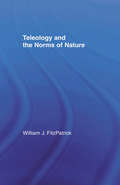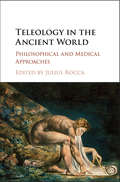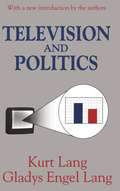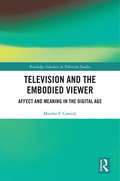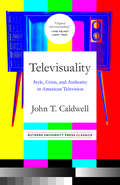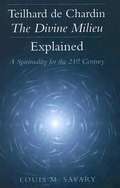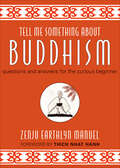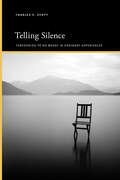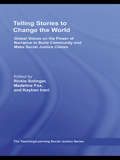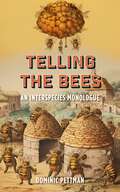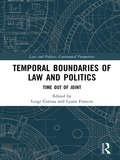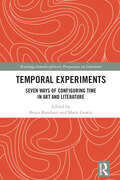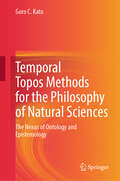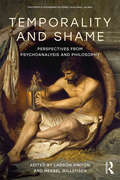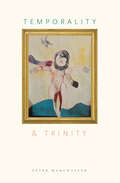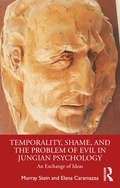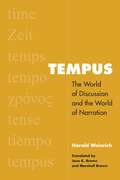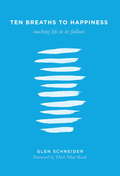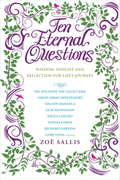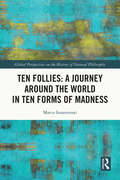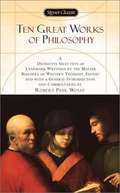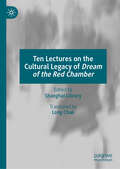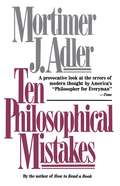- Table View
- List View
Teleology and the Norms of Nature
by William J. FitzPatrickThis work is an examination of teleological attributions i.e. ascriptions of proper functions and natural ends) to the features and behavior of living things with a view to understanding their application to human life.
Teleology in the Ancient World: Philosophical and Medical Approaches
by Julius RoccaThe ancient origins of teleological concepts are sometimes either conveniently forgotten or given a distorted appearance. On the one hand, ancient teleology has been obscured by the theological cloak of creationism. On the other, Darwinists have sometimes failed to give due consideration to the variety and subtlety of teleology's intellectual antecedents. The purpose of this book is to restore the balance by looking at the manifold ways in which teleology in antiquity was viewed. The volume, consisting of twelve essays by leading authorities in their fields, examines the ways in which teleological arguments were used in antiquity and how these discussions inform and influence current debates on evolution, creationism and intelligent design. As well as examining philosophical contributions to the subject, a specific aim is to examine ancient medical thinking on this topic and its relationship to ancient philosophical ideas.
Television and Politics
by Kurt Lang Gladys Engel Lang"The authorsahave analyzed the television problem brilliantly. They had come up with a whole set of new insights, and their backup research always is fascinating to read."-Saturday Review"A cautious, research-based bookahopefully it will set a trend."-Ithiel de Sola Pool, Public Opinion QuarterlyAfter more than forty years of studying its political implications, Kurt and Gladys Lang put the power of television into a unique perspective. Through carefully compiled case studies, they reveal surprising truths about TV's effect on American political life, and explode some popular myths. Their theme throughout is that television gives the viewer the illusion of being a favored spectator at some event-he "sees for himself," in other words. But, in fact, it conveys a reality different from that experienced by an eyewitness. Because the televised version of an event reaches more people, it has greater impact on the public memory and comes to overshadow what actually happened.The Langs tell in detail how television shapes events; how public figures and political institutions adjust their tactics to exploit the effects they-and millions of viewers-think television has. They examine such issues as whether or not network television projections influence election results. They consider the accuracy of the networks increasingly sophisticated techniques for "calling" election outcomes well before polls close. Such concerns have never been more at the forefront of the public consciousness than in the wake of the 2000 presidential election. The Langs assess the research to date and clarify the effects of early TV projections on voter turnout and election outcomes, and look at the implications for our system of government.A model of excellent policy analysis, this highly readable volume will interest decision-makers and analysts, as well as students of journalism, broadcasting, political behavior, and voters looking forward to the next election.Kurt Lang was a professor of sociology and political science at Stony Brook before becoming the Director of the School of Communications at the University of Washington. Gladys Engel Lang is a professor of communications with joint appointments in Political Science and Sociology at the University of Washington. In addition to Television and Politics, the Langs have also co-authored The Battle for Public Opinion: the President, the Press and the Polls during Watergate, Voting and Nonvoting, and Collective Dynamics.
Television and the Embodied Viewer: Affect and Meaning in the Digital Age (Routledge Advances in Television Studies)
by Marsha F. CassidyTelevision and the Sensate Body in the Digital Age appraises the medium’s capacity to evoke sensations and bodily feelings in the viewer. Presenting a fresh approach to television studies, the book examines the sensate force of onscreen bodies and illustrates how TV’s multisensory appeal builds viewer empathy and animates meaning. The book draws extensively upon interpretive viewpoints in the humanities to shed light on a range of provocative television works, notably The Americans, Mad Men, Little Women: LA, and Six Feet Under, with emphasis on the dramatization of gender, disability, sex, childbearing, and death. Advocating a biocultural approach that takes into account the mind sciences, Cassidy argues that interpretive meanings, shaped within today’s dynamic cultural matrix, are amplified by somatic experience. At a time when questions of embodiment and affect are crossing disciplines, this book will appeal to scholars and students working in the fields of television, film, and media studies, both in the humanities and cognitive traditions.
Televisuality: Style, Crisis, and Authority in American Television (Communications, Media, and Culture Series)
by John T CaldwellAlthough the "decline" of network television in the face of cable programming was an institutional crisis of television history, John Caldwell's classic volume Televisuality reveals that this decline spawned a flurry of new production initiatives to reassert network authority. Television in the 1980s hyped an extensive array of exhibitionist practices to raise the prime-time marquee above the multi-channel flow. Televisuality demonstrates the cultural logic of stylistic exhibitionism in everything from prestige series (Northern Exposure) and "loss-leader" event-status programming (War and Remembrance) to lower "trash" and "tabloid" forms (Pee-Wee's Playhouse and reality TV). Caldwell shows how "import-auteurs" like Oliver Stone and David Lynch were stylized for prime time as videographics packaged and tamed crisis news coverage. By drawing on production experience and critical and cultural analysis, and by tying technologies to aesthetics and ideology, Televisuality is a powerful call for desegregation of theory and practice in media scholarship and an end to the willful blindness of "high theory."
Telhard De Chardin-the Divine Milieu Explained: A Spirituality For The 21st Century
by Louis SavaryDuring the 20th century, Jesuit priest Teilhard de Chardin developed a truly revolutionary spirituality based on the discoveries of science and a comprehensive evolutionary perspective--a perspective never conceived of before by traditional spiritual writers. Through his integration of science and faith, Teilhard offered us a new way to understand the Word of God. In Teilhard de Chardin--The Divine Milieu Explained, author Louis M. Savary sets forth a series of revolutionary spiritual practices that integrate science and faith, based on the evolutionary spirituality of Teilhard's pathbreaking work, The Divine Milieu. As a result, this volume: -makes accessible to a wide audience the ideas of Teilhard's spirituality -explains principles of Teilhard's scientific thought not explicitly formulated in The Divine Milieu -shows that Teilhard's theology and spirituality are fully compatible with classical Christian theology -suggests many simple reflections or spiritual practices to help put Teilhard's spirituality directly into daily life Teilhard never spelled out for us how to practice this new understanding in our daily lives. And until we can practice it, this new transformative spirituality, remains simply a collection of revolutionary ideas about God that we can only talk about. Having taught and practiced Teilhardian ideas for almost forty years, author Louis M. Savary offers this work as a first step toward establishing new spiritual practices that translate Teilhard's ideas into action. It shows how to both think about one's faith and live it in light of evolutionary science.
Tell Me Something About Buddhism: Questions and Answers for the Curious Beginner
by Zenju Earthlyn ManuelOne of the first African American Zen priests provides “clear, beautiful, and inspiring answers to questions about Buddhist practice” (Charles Johnson, National Book Award–winning author of Middle Passage and Turning the Wheel).For anyone curious about the teachings of Buddha and modern Buddhist practice, Tell Me Something about Buddhism offers the perfect introduction. Written by Soto Zen priest Zenju Earthlyn Manuel and organized in an easy-to-use question-and-answer format, this concise book answers the many common questions people have about Buddhism, everything from who was Buddha to why do monks, nuns, and priests shave their heads.Manuel, who has been involved in Buddhist practice for over twenty years, after growing up in Los Angeles in an African American Christian church, intertwines throughout the book her personal experiences as one of the first African American Zen priests. Her life in the Sangha, her teaching in local communities, and her travels around the world meeting other Buddhist practitioners enliven her answers to the most fundamental questions about Buddhist practice, accompanied by her charcoal-and-pencil illustrations. As she writes: “Had I not opened myself to the many teachings from the earth, such as Buddha’s wisdom, it would have been nearly impossible to survive the fires of my soul.”“Offers both the story of her spiritual rite of passage from a black girl to a Buddhist priest, and a hands-on manual with the basic questions that many are afraid to ask.” —Dr. Marlene Jones, contributor to Dharma, Culture, and Color: New Voices in Western Buddhism
Telling Silence: Thresholds to No Where in Ordinary Experiences (SUNY series, Insinuations: Philosophy, Psychoanalysis, Literature)
by Charles E. ScottIn Telling Silence, Charles E. Scott speaks of silence, often indirectly, in such ways as to create occasions in which people might become more aware of silence in their experiences of themselves and the world around them. The core question of the book is: how can people be aware of silence without turning it into a thing and losing it? Lack of awareness of silence is lack of awareness of a major dimension of lives, both human and nonhuman. Attunements with silence enable attunements with being alive in the fragility that invests even the strengths of living beings. Telling Silence performs this attunement in descriptive accounts and instances of non-reflective awareness, awareness that does not deliberate or ponder. In twenty-three "fragments," poems, stories, and ways of thinking and speaking are brought together to intensify intimations of silence telling of itself.
Telling Stories to Change the World: Global Voices on the Power of Narrative to Build Community and Make Social Justice Claims (Teaching/Learning Social Justice)
by Rickie Solinger Madeline Fox Kayhan IraniTelling Stories to Change the World is a powerful collection of essays about community-based and interest-based projects where storytelling is used as a strategy for speaking out for justice. Contributors from locations across the globe—including Uganda, Darfur, China, Afghanistan, South Africa, New Orleans, and Chicago—describe grassroots projects in which communities use narrative as a way of exploring what a more just society might look like and what civic engagement means. These compelling accounts of resistance, hope, and vision showcase the power of the storytelling form to generate critique and collective action. Together, these projects demonstrate the contemporary power of stories to stimulate engagement, active citizenship, the pride of identity, and the humility of human connectedness.
Telling the Bees: An Interspecies Monologue
by Dominic PettmanIn a bid to wean himself off Facebook and Twitter, media scholar and cultural theorist Dominic Pettman decided to revive an ancient custom. He decided to tell the local bees of his thoughts, theories, musings, and meditations. The result was an apian journal that parses the daily news and the routines of modern life in a more sustained and reflective way than the Pavlovian posts to which we are so addicted.The account that emerges from Pettman’s regular discussion with the bees forms a compelling portrait of the tumultuous period running from the Fall of 2019 to New Year’s Eve, 2022. What began as a reflection on the traumatic effects of an “unprecedented” presidency soon evolved into a real-time response to the equally extraordinary events of the pandemic and its aftermath. One key concern that emerges from Pettman’s ongoing discussion with the bees is the extent to which, thanks to the alienating effects of neoliberalism, we were already engaged in an advanced form of social distancing long before anyone had heard of COVID. Other key themes include education, human-animal relations, climate change, mediated intimacy, attention ecologies, collective memory, slow violence, the self-fulfilling prophecy that is New York City, the never-ending end of history, and the mundane strategies we share in a bid to forge on, despite the accumulating challenges of the twenty-first century. Telling the Bees is an invitation to rediscover the art of reflection and a profound meditation on human connection, alienation, and our collective yearning for intimacy in an age of distance. Through what Pettman describes as an "interspecies monologue," readers are treated to a unique perspective on navigating the complexities of the twenty-first century, inspired by the ingenuity and resilience of our natural cohabitants.
Temas básicos de ética (4A Edicion)
by Xabier Etxeberria MauleonEn este volumen ofrece, por un lado, temas relacionados con nuestra condición de seres inacabados y abiertos que aspiran a realizarse lo más libre y plenamente posible: ética como horizonte de plenitud (felicidad, virtudes, valores, etc.); por otro lado, temas que nos sirven de guía para una convivencia en justicia que tiene en cuenta la problematicidad de nuestra sociabilidad: ética como ideal de convivencia (autonomía, deber, justicia, etc.). Con ello se pretende elaborar una ética fundamental básica, pero abierta, que nos pone en contacto con las teorías de los grandes pensadores.
Temporal Boundaries of Law and Politics: Time Out of Joint (Law and Politics)
by Luigi Corrias Lyana FrancotIn the last decade, the changing role of time in society has once again taken centre stage in the academic debate. A prominent, but surely not the only, aspect of this debate hinges on the so-called acceleration of time and its societal consequences. Despite the fact that time is fundamental to the way in which law and politics function, the influence of the contemporary experience of time on law and politics remains underdeveloped. How, for example, does society’s structural acceleration impact on justice? Does law actually offer stability and predictability in an ever-changing global world? How can legal and political institutions function in the wake of ever-increasing uncertainty? Both law and politics employ time to order society but they are also limited in what can be effectuated by time. It is this very tension between temporal possibilities and limitations that the contributors to this collection – drawn from different fields of law, as well as from other disciplines – examine.
Temporal Experiments: Seven Ways of Configuring Time in Art and Literature (Routledge Interdisciplinary Perspectives on Literature)
by Marit Grøtta Bruce BarnhartTemporal Experiments: Seven Ways of Configuring Time in Art and Literature conducts an expansive exploration of different modes of timing. Its seven chapters pursue the question of time as it is embodied in key figures that shape both aesthetic and pragmatic life. Working closely with literary, visual, and musical artworks, the book aims to provoke new ways of engaging with the question of time. It treats artworks as experiments that launch temporal figures, and that test out the possibilities and connections these different figures enable. Thus, the book seizes upon works by artists like Anne Carson, King Tubby, and Raymond Queneau as opportunities for thinking through the valence of both existing and untested temporal configurations. What other modes of shaping time, it asks, might be conjured out of the viewing of an Omer Fast film, the reading of a poem by Baudelaire, or of a novel by Tom McCarthy? In treating artworks as temporal experiments, this book stresses the fact that artworks always experiment with the raw materials of time, fashioning it or refashioning it into novel combinations. This book follows the imperatives of these experiments in order to advance a nuanced understanding of the way time insinuates itself into all aspects of social and intellectual life.
Temporal Logics in Computer Science
by Stéphane Demri Valentin Goranko Martin LangeThis comprehensive text provides a modern and technically precise exposition of the fundamental theory and applications of temporal logics in computer science. Part I presents the basics of discrete transition systems, including constructions and behavioural equivalences. Part II examines the most important temporal logics for transition systems and Part III looks at their expressiveness and complexity. Finally, Part IV describes the main computational methods and decision procedures for model checking and model building - based on tableaux, automata and games - and discusses their relationships. The book contains a wealth of examples and exercises, as well as an extensive annotated bibliography. Thus, the book is not only a solid professional reference for researchers in the field but also a comprehensive graduate textbook that can be used for self-study as well as for teaching courses.
Temporal Topos Methods for the Philosophy of Natural Sciences: The Nexus of Ontology and Epistemology
by Goro C. KatoThis book is a first attempt to unify and explain, through the language of pure mathematics called categories and sheaves, the mechanism of mental activities. Humanities and philosophy meet physics and mathematics at both levels of the microcosm and macrocosm. The purpose of this book is to provide systematic and unifying methods for the physical and the cognitive aspects of a conscious entity. The philosophical thoughts of the West and the East will be formulated and presented in terms of categories and sheaves using pure mathematics. A definition-based rigorous approach and method using categorical sheaf theory is a completely new attempt to formulate the ontological philosophies, which must be consistent with quantum physics. For example, it is the author’s intent to capture reality as a pair of the cognitive realm and the physical realm, for which the author uses the notion of (temporal) topos theory, as a pair of an initial object and a terminal object of temporal topos. This book allows philosophers and natural scientists to interact to discuss and observe the physical world and the cognitive world. That is, a brain existing in the physical world is simultaneously functioning in the cognitive world. The author provides detailed descriptions for the process from the small to the large, which is a part of descent-sheaf theory in mathematics by gluing the local data to obtain a global object. A description of a process of “understanding” (and realizing-recognizing-discovering) is also formulated in terms of temporal topos language. The author provides all the needed mathematical background so that readers whose main interests are in humanities can enjoy and appreciate the rigorousness and the harmony of humanities and natural sciences.
Temporality and Shame: Perspectives from Psychoanalysis and Philosophy (Philosophy and Psychoanalysis)
by Ladson Hinton Hessel WillemsenWinner of the 2018 American Board and Academy of Psychoanalysis (ABAPsa) prize for best Edited book Temporality has always been a central preoccupation of modern philosophy, and shame has been a major theme in contemporary psychoanalysis. To date, however, there has been little examination of the critical connection between these core experiences. Although they deeply implicate each other, no single book has focused upon their profound interrelationship. Temporality and Shame highlights the many dimensions of that reality. A core point of this book is that shame can be a teacher, and a crucial one, in evaluating our ethical and ontological position in the world. Granting the fact that shame can be toxic and terrible, we must remember that it is also what can orient us in the difficult task of reflection and consciousness. Shame enables us to become more fully present in the world and authentically engage in the flow of temporality and the richness of its syncopated dimensionality. Such a deeply honest ethos, embracing the jarring awareness of shame and the always-shifting temporalities of memory, can open us to a fuller presence in life. This is the basic vision of Temporality and Shame. The respective contributors discuss temporality and shame in relation to clinical and theoretical aspects of psychoanalysis, philosophy, anthropology, and genocide, as well as the question of evil, myth and archetype, history and critical studies, the ‘discipline of interiority’, and literary works. Temporality and Shame provides valuable insights and a rich and engaging variety of ideas. It will appeal to psychotherapists and psychoanalysts, philosophers and those interested in the basic philosophical grounds of experience, and anthropologists and people engaged in cultural studies and critical theory.
Temporality and Trinity
by Peter ManchesterTemporality and Trinity argues that there is deep homology between the roles of temporal problematic in Augustine’s On Trinity and Heidegger’s Being and Time.Although Heidegger was aware of On Trinity, the claim is not that he writes under its influence. Rather, Manchester moves from the temporal problematic of Being and Time to the psychological explication of the human image of God in On Trinity, schematized as memory, understanding, and will. Formal and phenomenological parallels allow interpretation of that psychological triad as a temporal problematic in the manner of Being and Time. In a sense, this is to read Augustine as influenced by Heidegger.But the aim is more constructive than that. Establishing a link between trinitarian theology and Being and Time opens a more direct way of benefiting from it in theology than Heidegger’s own assumptions. It puts philosophy in a position to confront New Testament theology directly, in its own historicality, without digression into anything like philosophy of religion.
Temporality, Shame, and the Problem of Evil in Jungian Psychology: An Exchange of Ideas
by Murray Stein Elena CaramazzaIn a unique epistolary style, authors Murray Stein and Elena Caramazza share their rich and reflective conversations surrounding the themes of temporality, shame, and evil through letters, essays, and email correspondence. Ignited by Wolfgang Pauli’s "The Piano Lesson," Stein and Caramazza study the function of temporality and consider the importance of shame and evil to this relationship. In this book Stein shows how Pauli, as a result of his contact with C.G. Jung and analytical psychology, embarked on a thought experiment to merge two currents of scientific thought: quantum physics and depth psychology. In his work of active imagination "The Piano Lesson," Pauli playfully brings together the former, which supplies a causal explanation of the mechanics of the material world, and the latter, which supplies an approach to meaning. The problem of how to merge the two currents in one language is presented in Pauli’s symbolic solution, piano music, which combines the black and white keys in a single harmony. This music symbolizes a unified theory that combines the explanations of causality and the meaning delivered by synchronicity. Presenting an original approach to synchronicity and dis-synchronicity, this interdisciplinary and innovative exchange concludes with a script written by Murray Stein, inspired by Pauli, as well as an afterword by influential Jungian scholars. This book will be a key reference for undergraduate and postgraduate courses and seminars in Jungian and post-Jungian studies, philosophy, psychoanalytic studies, psychology, and the social sciences.
Tempus: The World of Discussion and the World of Narration (Verbal Arts: Studies in Poetics)
by Harald WeinrichA foundational book by one of the most distinguished German humanists of the last half century, Tempus joins cultural linguistics and literary interpretation at the hip. Developing two controversial theses—that sentences are not truly meaningful in isolation from their contexts and that verb tenses are primarily indicators not of time but of the attitude of the speaker or writer—Tempus surveys a dazzling array of ancient and modern texts from famous authors as well as casual speakers of German, French, Italian, Spanish, Portuguese, Latin, and English, with a final chapter extending the observations to Greek, Russian, and world languages.A classic in German and long available in many other languages, Tempus launched a new discipline, text linguistics, and established a unique career that was marked by precise observation, sensitive cultural outreach, and practical engagement with the situation of migrants. Weinrich’s robust and lucid close readings of famous and little-known authors from all the major languages of western Europe expand our literary horizons and challenge our linguistic understanding.
Ten Breaths to Happiness
by Thich Nhat Hanh Jason Deantonis Glen SchneiderSimple practices to help us cultivate happiness and fulfillment in the course of our daily lives.Happiness is far more than a positive feeling that comes and goes, happiness is wired into the physiology of our brains. It is a skill we can all develop through cultivating mindfulness and concentration. In Ten Breaths to Happiness Schneider presents a series of simple practices and guided meditations that allow you to literally rewire your neural pathways to experience deeper and more lasting fulfillment and peace.Studies in neuroscience show that it takes about thirty seconds to build a new neural-pathway. Schneider takes these findings and combines them with mindfulness practices based on the teachings of Zen teacher Thich Nhat Hanh. For example, he encourages us to take ten conscious breaths whenever we encounter something beautiful or have a meaningful experience. Consistently exercising this simple practice creates an opportunity for the brain to move from its default reaction of protection to one of appreciation and spaciousness.In ten short chapters, Schneider discusses the nature of happiness and its role in our evolution. He shows how our brains can make us happy or create suffering, and he introduces simple, proven techniques that will shape our brains over
Ten Eternal Questions: Wisdom, Insight and Reflection For Life's Journey
by Zoë SallisTen Eternal Questions asks leading political, artistic, and religious figures the timeless spiritual questions. "What is your concept of God?" "Do you think this life is all there is?" are just two of the ten questions author Zo Sallis puts to such diverse figures as Nelson Mandela and U2's Bono, Shimon Peres and Jack Nicholson, Paulo Coelho and the Dalai Lama. <P> <P> Chapters are organized by question with extracts drawn from Sallis's interviews with almost 40 personalities, among them Bob Geldof, Gore Vidal, Prince Mangosuthu Buthelezi, Gianfranco Ferre, Farah Pahlavi (the exiled Empress of Iran), Anjelica Huston, as well as other artists, scientists, and religious figures. In these days of increasing commercialism and religious polarization, this absorbing book speaks to an impulse for a stronger spiritual dimension in our lives and its range of answersspontaneous, surprising, and insightful; provocative, considered, and personally revealingoffers readers much to ponder and reflect upon in their own quest to understand life's mysteries.
Ten Follies: A Journey Around the World in Ten Forms of Madness (Global Perspectives on the History of Natural Philosophy)
by Marco InnamoratiTen Follies: A Journey Around the World in Ten Forms of Madness focuses on a critical question in the history of psychiatry: to what extent does psychopathology describe phenomena that exist before or beyond their description? Marco Innamorati probes the view that any description of a psychopathological phenomenon is, to a significant extent, the result of a construction by the subject describing it or a co-construction made by the clinician and the patient—a perspective also known as the “constructivist” approach.Starting from the work of the philosopher and historian of science Ian Hacking, who proposed the concept of “transient mental illness”, i.e., an “illness that appears at a given time, in a given place, and then disappears” (Hacking, 1998), Innamorati explores some forms of madness that seem to arise in a particular environment and in specific historical circumstances, developing through a kind of epidemic and then disappearing almost definitively. The author evaluates strengths and weaknesses of the “constructivist” approach, by juxtaposing evolving hermeneutical questions to cultural factors. From hysteria to demonic possession, from the “mad travellers” to arctic shamanism, until the recent mushrooming of the hikikomori phenomenon,Ten Follies is an unconventional “journey around the world in ten forms of madness” which takes the reader through astonishing stories of suffering and healing. Against the trend of mapping a single globalised discourse of “folly”, this book embraces a kind of philosophical perspectivism (“ten follies”) which echoes the contemporary cultural transformation of the many narratives of “madness”.
Ten Great Works Of Philosophy
by Robert Paul WolffIn its vast scope, this book presents the continuum of Western philosophy. Ranging from ancient Greece to nineteenth-century America, it traces the history of our civilization through the seminal works of its most influential thinkers. Each philosopher in this volume made intellectual history; each created a revolution in ideas; each reaffirmed man's view of himself as a sentient being capable of creating order out of the baffling contradictions of existence. And the most powerful reflections and speculations of each are represented here. Plato: Apology, Crito and the Death of Socrates, from Phado Aristotle: Poetics St. Ansem: The ontological Proof of St. Ansem, from Proslogium St. Thomas Aquinas: St. Thomas' Proofs of God's Existence, from the SummaTheologica René Descartes: Meditations on the First Philosophy David Hume: An Inquiry Concerning Human Understanding Immanuel Kant: Prolegomena to Any Future Metaphysics John Stuart Mill: Utilitarianism William James: The Will to Believe
Ten Lectures on the Cultural Legacy of Dream of the Red Chamber
by Shanghai LibraryThis book offers a profound exploration of the classic Chinese novel Dream of the Red Chamber, recognized as a masterpiece of traditional Chinese literature. Developed from a series of lectures at the Shanghai Library, the text features insights from ten prominent scholars, including Wang Meng and Bai Xianyong, addressing themes such as poetic aesthetics, tragic beauty, female perspectives, and cultural symbolism. The chapters delve into multifaceted interpretations, connecting literature with cultural, philosophical, and artistic heritage. Designed for both specialists and general readers, this book enriches understanding of one of the world’s literary treasures, blending cultural appreciation with critical scholarship. It highlights the novel’s timeless narrative, intricate character portrayals, social critique, and artistic sophistication, offering a gateway to understanding Chinese culture’s enduring legacy and its global significance. Readers will discover rich analyses, compelling arguments, and fresh perspectives that deepen their appreciation for this unparalleled literary classic.
Ten Philosophical Mistakes
by Mortimer J. AdlerAn illuminating critique of modern thought from America's "Philosopher for Everyman" (Time).Ten Philosophical Mistakes examines ten errors in modern thought and shows how they have led to serious consequences in our everyday lives. It teaches how they came about, how to avoid them, and how to counter their negative effects.
